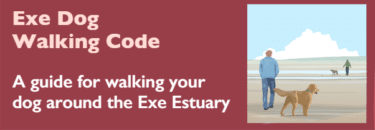The Exe is a beautiful area to explore and is enjoyed by many dog walkers.
The whole of the Exe Estuary is a nationally and internationally important site for wildlife, including Sites of Specific Scientific Interest (SSSI) and a Special Protection Area (SPA).
This guidance offers advice on how dog walkers can enjoy the Exe, whilst being considerate to other users and wildlife, particularly in sensitive areas or at certain times of year.
Walkies
For a safe and happy walk with your dog please:
- keep your dog under effective control at all times, on a short lead or close enough for you to call your dog back on command, as other users may be wary of dogs off leads
- bag and bin your dog’s poo – it can affect water quality of the estuary. Any litter bin will do!
- be aware of the dangers from rising tides, soft mud, cliff edges and strong currents
- follow instructions provided on warning and information signs around the estuary
- some areas have legal restrictions on the number of dogs that one person can be responsible for, often a maximum of six dogs. Check Devon Loves Dogs for more information
- Never go into the water to rescue your dog, in an emergency dial 999 and ask for the Coastguard
Be bird aware
The Exe is full of the wonderful sights and sounds of nature. We can all do our part in caring for this special place and allowing space for birds.
What is disturbance?
Disturbance is any activity or noise that could change the behaviour of an animal (such as feeding, resting or breeding).
What happens to the birds after they’ve been disturbed?
When birds are disturbed they stop feeding, or fly away. Losing energy can affect their overall condition and survival rate.
Why can’t the birds rest and feed elsewhere?
At high tide the birds need to rest to conserve energy. On the Exe there is little ground above high water where they can rest undisturbed – Dawlish Warren is one of the few places they can go.
Birds are naturally drawn to feed in areas which are rich in nutritious food. By forcing birds away from these areas they will be pushed to lower quality feeding grounds which can affect their survival.
Watch out for Wildlife
During winter thousands of birds flock to the Exe to rest and feed on their long migratory journeys from places as far away as Siberia. Two areas within the estuary have been identified as vital areas for protected birds, identified as Wildlife Refuges. Eelgrass beds within these areas are a valuable food source for migrating birds. The Dawlish Warren Refuge is also one of the most important high tide roosts on the estuary. Enjoy watching wildlife, but keep a distance of 100m to avoid putting birds into flight.
To make sure the site can be enjoyed bu future generations please:
- avoid Wildlife Refuges where safe to do so
- keep noise to a minimum
- avoid eelgrass beds and areas where birds are feeding or roosting
- use dedicated access point and keep to paths
- do not park vehicles on the foreshore
- do not allow your dogs to chase birds, wildlife or livestock
Join Devon Love Dogs!
It’s free to join and as a member you’ll receive a free welcome pack and be the first to hear about events for you and your dog.
-
Contact details for further information
Exe Estuary Management Partnership
Exe Estuary Officer: Phone 01392 382236
Safety/Pollution
Coastguard: call 999 or VHF Ch 16
Harbour Authority (River and Canal Office)
Office hours: Phone 01392 265791
Out of hours emergency: Phone 0845 351 1060Fisheries
Devon and Severn Inshore Fisheries and Conservation Authority (D&S IFCA): Phone 01803 854648 or 07740 175479
Wildlife
Dawlish Warren Visitor Centre: Phone 01626 863980
Natural England – Devon office: Phone 0300 060 3900
Injured marine mammals (BDMLR): Phone 01825 765546
SEDHRP Mitigations Officers: Email habitatmitigation@eastdevon.gov.uk
